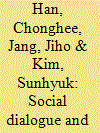| Srl | Item |
| 1 |
ID:
119917


|
|
|
|
|
| Publication |
2013.
|
| Summary/Abstract |
This paper applies discourse analysis to policies surrounding the siting of radioactive waste disposal facilities in South Korea. We question the premises of previous studies that define the radioactive waste disposal facilities decision outcomes in Korea as 'repeated failures'. Instead, we suggest that underlying ideas and value systems surrounding the policy problem differ between supporting and opposing parties. In particular, our focus is on the 'framing' strategies manifest in policy discourse. Our analysis of newspaper articles shows that participants define and frame the policy issue in distinctive ways. Framing strategies include selective attention to, and naming of, the policy issues in the processes of frame articulation, amplification, extension and transformation. Overall, our analysis shows that framing analysis is a useful tool for understanding the policy decision-making process from a different perspective than traditional policy analysis.
|
|
|
|
|
|
|
|
|
|
|
|
|
|
|
|
| 2 |
ID:
103191


|
|
|
|
|
| Publication |
2010.
|
| Summary/Abstract |
This paper analyses the sweeping changes in industrial relations in South Korea that have taken place since democratisation in 1987, which gave workers the right to organise themselves, and critically reviews the development of social dialogue since the financial crisis of 1997. A number of international labour specialists have maintained that social dialogue plays an important role in enhancing economic restructuring and the stability of industrial relations in order to compete in a global economy. Contrary to the positive assessment of social dialogue, the paper argues that the Korean Tripartite Commission has not reduced the antagonism between unions and employer organisations due to the influence of embedded, state-led economic development. The financial crisis of 1997 merely provided a catalyst to propel the 'historic compromise' of February 1998, without creating effective institutional arrangements to maintain social dialogue. It is worth noting that the uncertainty of social dialogue results from the inability of the Korean Tripartite Commission to encourage employers and workers to trade off wage restraint for job security in the context of a lack of social welfare protections. The paralysed Korean Tripartite Commission provides fertile ground for reflecting on the complex relationship between social dialogue and institutional arrangements.
|
|
|
|
|
|
|
|
|
|
|
|
|
|
|
|